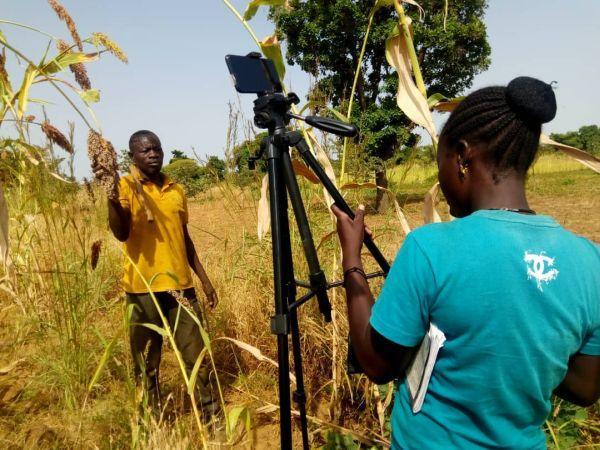パーマカルチャー・マガジン賞
パーマカルチャー・マガジン賞はパーマカルチャーの分野において、三年以上にわたって人々に感銘を与える活動を提示すことができる個人、コミュニティ、企業、グループ、あるいは組織に贈られます。
Permaculture Magazineとの共同運営
このアワードではパーマカルチャー分野でのプロジェクトを募集しています。例:傷ついた土地の再生、生物の生息地と生物多様性の向上、地域の人々が実践的なスキルを身につけるための支援、地域経済を発展と生産物の価値の向上、コミュニティの構築、社会的指導者やより確かな経済的耐久性の創出、新しい協調のあり方や 新しい文化のパラダイムの構築など
受賞者たちはPermaculture Magazineが提供する£15,000(約240万円)を共同で授与されます。
2023 受賞者
3 人の受賞者がPermaculture Magazineから提供される 15,000 ポンドの賞金を分け合います。
受賞者およびその他のファイナリストのリストは以下をご覧ください。
勝者
Sol Haven
コミュニティ利益会社のSol Haven (SOL LAUG HAVENS C.I.C.として登録) は2018年英国で、創業者たち自身の持続可能な農業への情熱と、住居を失うという個人的な体験を元にスタートしました。
そのビジョンとして掲げるのは、英国中に持続可能なパーマカルチャーのケアのできるハブを作り、そこで農村部の芸術や工芸の展示をすると共に持続可能な地域の食物を提供するといった、青写真の作成です。
更にこのプロジェクトでは、より良い今日とより明るい未来の在り方を決定するのに活用できる実用的な環境を探求・開発・創造することを目指しています。現在非常に現実的なニーズを持っている人々を巻き込むことで、人生を変え、コミュニティを構築する真のチャンスを捕らえることにもなります。
Sol Havenは、使われなくなった農場の建物や庭園を再生して、地域社会の強化に貢献する様々な団体やイベントを受け入れる社交場を作りました。
当プロジェクトの「心を耕す」12週間コースは、メンタルヘルスに苦しむ人々がコミュニティや本人自身と再びつながりを持ち、新しい友情を築けるよう、丁寧に設計されています。
コース内容:
- 自然と園芸療法
- メンタルヘルス教育
- 動く瞑想
- ドラム演奏
- 料理
アクティビティを組み合わせながら支援を行い、表現の場を与え、新しいスキルを学べるよう導きます。
Sol Havenは、上記のプログラムを完了した今、より幅広いプログラムで人々をサポートしようとしています。今後も、人々が他者や社会と関わり、仕事を見つけることへの障壁を克服するのを、引き続き支援します。
- 2023
- Permaculture Magazine Award
プロジェクト情報
- English
- https://slhavens.co.uk/
- https://www.facebook.com/sollaughavens
- 01604 307783
- admin@slhavens.co.uk
- Sol Haven, New Manor Farm, Moulton, Northampton, NN3 7RB, United Kingdom
勝者
Tejiendo Futuros ONG
Tejiendo Futuros ONGは、2018年にグアテマラのパナハチェルの自治体で設立されました。
この団体は、地域コミュニティの深いニーズに応えて設立されました。社会構造からくる暴力や国家が国民を見捨てたことによりさまざま問題が顕在化し、その結果、医療へのアクセスや教育、適切な住宅、労働、そして社会的受容が欠如したためです。また、パナハチェルは観光地でもあり、住民の多くが不安定な労働環境に置かれています。
Tejiendo Futurosは総合的な教育、アグロエコロジー、心理社会的ケア、健康という4つの優先課題に焦点を当てた包括的な活動モデルを開発することでこれらの問題を克服し、地域のニーズに応える活動を行っています。
活動内容:
- 50家族以上と協力
- 約100人の子どもたちに教育を提供
- 総合的なヘルスケア
- アグロ・エコロジー・プロダクション・センターの開発
ホリスティックスクール「The Tree of Childhood」:子どもたちや青年たちに無料の教育と食事を提供し、最適な学習環境を整えています。
母親と父親には「Strengthened Families」プログラムを通じて心理社会的なケアを提供しています。ここでは、彼らが自尊心や新しい男性像、責任ある母性/父性、セルフケアに関するワークショップを通じて、否定的な行動パターンを排除できるよう取り組んでいます。
「Healthy Mind, Healthy Body」プログラムによりメンバーの心身の状態を常に測定し、健康を維持するために質の高いケアを提供しています。
農業生態学的プログラム「KaUlew」(Our Land in Cakchikel)により、健康的なライフスタイル、責任ある消費、環境意識、アントレプレナーシップ(起業家的意識)、古くからの生産手法の回復を推奨しています。
- 2023
- Permaculture Magazine Award
プロジェクト情報
- Spanish, English
- https://tejiendofuturos.org/en/inicio-eng/
- https://www.facebook.com/TejiendoFuturosPana/
- https://twitter.com/TejiendoFuturos
- +502 4216 9533
- info@tejiendofuturos.org
- Calle a Santa Catarina Palopó, Zona 3 Panajachel Sololá 07010 Guatemala
勝者
Unidosソーシャルイノベーションセンター
Unidos Social Innovation Centreは、2018年に、ウガンダのナキバレ難民施設に住む難民グループによって設立されました。この施設はコンゴ、ブルンジ、ソマリア、エチオピア、南スーダンといった近隣諸国や文化圏から約12万人の難民を受け入れています。この12万人のうち、1万4200人ほどが農業従事者です。
Unidos Social Innovation Centreは、ウガンダで難民への食糧配給が大幅に削減された後、地域社会で生計手段の創出と食糧安全保障を支援するために集結しました。
この団体は、貧困、気候変動、戦争、母国からの政治的抑圧など、人々が直面している大きな課題の解決策を模索しています。活動はすべて、包摂的教育と起業スキルを通じたエンパワメントをベースにしています。
コース内容:
- 環境にやさしい農法
- 英語
- 経営とリーダーシップ
- 女性のエンパワメント
様々な外部拠点でパーマカルチャーを実践しつつ、この団体は2021年自前の教育センターを建設。
それ以来ソマリアからコンゴ、ブルンジに至るまでの700名近くを支援し、エコロジカル農法を行う農家として巣立てるよう支援してきました。
この団体は現在、土壌の再生に関心を持っており、ナキバレ難民キャンプの不毛な土壌への解決策にもなるミミズ堆肥の作り方や、それがより多くの食料を育てるために有用であるということを、何千人という人々に向けて教育・実践しています。また、市販できるサイズのミミズ堆肥化システムに可能性を見出しており、ナキバレの教育センター近くにそのようなシステムを1つ設置しました。
- 2023
- Permaculture Magazine Award
プロジェクト情報
- English, Swahili, French
- https://unidosprojects.org/
- https://www.facebook.com/Projectunidos/
- +256773202660
- projectunidos@gmail.com
- Nakivale Refugee Settlement, Western Region of Uganda
こちらも候補に挙がっています
Bioregional Weaving Lab (Waterford)
Bioregional Weaving Lab Waterfordは個別の取り組みをまとめて集団で結果を出すアプローチに変えることで全体的な変化を起こすべく、場所をベースとしたアプローチを取っています。そうすることでまた、長期的な変革とリジェネレーションをも支援しています。景観、海景、地域社会の繁栄を支えられるような、レジリエンスを伴った食料システムの構築を目指しています。
活動内容:
- ネットワークとデスクトップリサーチを駆使して地域の食料システム全体の利害関係者とつながりを作っています。その範囲は、アイルランドのウォーターフォード地域の農家、教師から、意思決定者にまで及びます。現地まで赴いて彼らに会い、信頼を築き、マルチステークホルダー・ワークショップも主催しています。
- 土壌、流域、バイオタイプの地図を見て、土地を歩き、人々と話すことで、その地域のバイオリージョンの自然な境界を特定しています。
- システム変更の必要性を察し、戦略設計のためのツールと方法論を適用ながら、バイオリージョン内の農村および都市環境でのホリスティックな(自然、社会、財政、および精神面での)再生を推進しています。
アイルランドのBioregional Weaving Labは2019年に始まり、ウォーターフォード市内の、リジェネラティブな庭園を備えたGROW HQカフェにあるGrow It Yourself (GIY)事務所に場所を構えています。GIYは2008 年に設立された社会的企業で、学校、コミュニティ、会社、メディアプログラムを通じて食への共感を高めています。彼らの支援により、参加者約100万人が、自らの食料の少なくとも一部を栽培し始めています。
アイルランドのBioregional Weaving Labは、Commonland、Ashoka、The Presencing Instituteが取り持っている拡大中の欧州共同体の一員です。
- 2023
- Permaculture Magazine Award

プロジェクト情報
- English
- https://giy.ie/programmes/bioregional-weaving-lab/
- +47 99013403
- sarah@giy.ie
- GIY, GROW HQ, Farronshoneen, Dunmore Road, Waterford City, Co. Waterford, X91 NX30, Ireland
Groundswell International
Groundswell Internationalは2009年に設立されました。世界中から集まった代表者たちは、アフリカ、南北アメリカ、アジアでのコミュニティ主体の社会変革強化を目指す効果的なアプローチ開発における、数十年にわたる協力関係と経験を元に、パートナーシップを築いています。
Groundswellの書籍『Fertile Ground: Scaling AE [Agroecology] from the Ground Up』(団体の共同創立者がこの著書)が述べているように、「世界では約25 億人が、5億の農場で、小規模の家族経営での農業と食料生産に携わっています。自然に逆らうのではなく、自然と共に、生産的かつ持続的に農業を営む彼らの創造的な力は、おそらく最も強力な勢いとなり、飢餓、貧困、気候変動、環境劣化という相互に関連する課題を克服するために、解き放たれることになるでしょう。」
Groundswellは、地域社会を強化して健全な農業と食料システムをゼロから構築するという、志を同じくする動きに加わると同時に、成長し続ける世界的なアグロエコロジーと食料主権の運動にも貢献しています。
地域のパートナー団体の能力と効果を高めることで、地域社会、農家、先住民族の組織に対し、社会変革を主導する力を与えもします。
活動内容:
- プログラムの共同設計プロセス
- パートナーとアライの間の相互学習の促進
- 技術的および方法論的トレーニングのサポート
2021年、Groundswellはパートナー団体に対して154万1千ドルを提供しました。全体では、2009年以来、パートナープログラムに合計1,372万7千ドル強を分配しています。
その活動は、気候変動の影響を受けた土地を再生するだけでなく、関係者に経済的利益をもたらし、健康と栄養を改善し、ジェンダー平等の観点から移住の誘因を減らしてもいます。
- 2023
- Permaculture Magazine Award

プロジェクト情報
- English, Arabic, Chinese, Dutch, French, German, Italian, Portuguese, Russian, Spanish
- https://www.groundswellinternational.org/
- https://www.facebook.com/GroundswellInternational
- https://twitter.com/GroundswellInt
- escully@groundswellinternational.org
- 712 H Street, NE, Suite 1355 Washington District Of Columbia, 20002, United States
Habiba Community (ハビバ・コミュニティ)
Habiba Communityは、エジプトのシナイ半島を拠点とするボトムアップの取り組みです。2019年にEcosystem Restoration Camps (ERC) 運動に参加し、今では南シナイでのリジェネラティブで持続可能な開発モデルを促すこの運動に参加する多くの組織のひとつとなっています。
Habibaは最終的にシナイ砂漠を再緑化することを目指しています。南シナイ地域を回復させようとするHabibaの取り組みは、この半島全体を回復させるべく進行中の国際的な取り組みと一致しています。ここは何千年も前、生命と生物多様性の豊かな森林に覆われた地域だったのです。包摂性を実現し、地元の市場への公平なアクセスを持つ75の農場(うち48はベドウィン族が所有)から成るネットワークを築き上げ、すべての人に平等な機会を提供してウェルビーイングを保証することで、この開発モデルは、人々の意識に変化を与えました。
Habibaは、パーマカルチャーや自然システム回復に関する教育と取り組みを、地域のベドウィン族との協力という目標と組み合わせています。ERCの目標である、個人の健康とウェルビーイングのための環境回復とリジェネラティブな慣行をテーマにした教育プログラムの提供も支持しています。
これまでの活動:
- リジェネラティブな農業技術の導入
- 浸食を食い止める
- 更なる砂漠化の回避
- 健全な生態系に基づいて、地域の生活を再建
Habibaの主要な資産は、砂漠におけるリジェネラティブな有機農場です。 ここでは、持続可能な農業技術と実験に、最先端の手法を取り入れています。この農場は、食品の生産方法を変化させています。また地域社会のコラボレーションが行われる国際的な知識のハブともなっています。
Habibaは現在、海辺の町ヌウェイバにて、気候変動へのレジリエンスを持つ地域社会作りに取り組んでいます。
- 2023
- Permaculture Magazine Award

プロジェクト情報
- English, Arabic
- https://www.habibacommunity.com
- https://www.facebook.com/habiba.organic.farm
- https://twitter.com/habibacommunity
- maged@habibacommunity.com
- Mazraa Road Arab Hemdan Nuweiba South Sinai, 8791003, Egypt
Komunidad Kolinda
2018年設立のKomunidad Kolindaは、国際的なエコ・コミュニティです。メキシコのオアハカに位置する温暖で標高の高いシエラ・スル山脈にある、6.5 ヘクタールの森林に覆われた共有地で、自律的かつ調和的に暮らすことを目指す11人の国際色豊な永住者で構成されています。
このコミュニティは、リジェネラティブな農法及び森林再生技術、バイオコンストラクション、伝統医学、芸術、教育、精神性を、地元のサポテック先住民と密接に連携しながら実践しています。
食料、水、健康、エネルギー、建材の面で、可能な限り高いレベルの自立を目指しています。コミュニティの一体感を守るために、Kolindaは、シンプルな内部規則を設けています。それは、全員の承認なしには家を売買する権利は誰にも与えられず、また新しいメンバーは既存のメンバーの同意をもってコミュニティに加わるというものです。土地は共同管理されています。
このコミュニティが誕生した地は、そのほとんどが混交林でした。活動の主軸は、道路、水道システム、共同住宅、3つの住宅といったインフラの整備にあります。そこでは、常任および臨時のメンバーが暮らし、来訪者、ボランティアを受け入れ、イベントを開催しています。
多種多様な野菜を育てるために何百メートルにも及ぶテラスも作りました。フードフォレストの設計の一部として、何十本もの果樹を直に植えています。そのすべては外部からの資金提供なしに達成したものです。
このコミュニティはやがて「House of Healing」や薬用植物園、「Bosque de Mil Anos」といった植林プロジェクトなど、周辺のコミュニティに恩恵をもたらすプロジェクトに焦点を移していく予定です。
- 2023
- Permaculture Magazine Award

プロジェクト情報
- Spanish, English
- https://kolinda.oaxacasierrasur.com
- komunidadkolinda@gmail.com
- Carretera A Extebe San Ildefonso Amatlan, Oaxaca, 70877, Mexico
NILE Journeys
NILE Journeysは、2016年にナイル川流域のコミュニティのためのプラットフォームとして設立されました。その取り組みはナイル川流域諸国にあるコミュニティ・ハブを通じて展開されています。現在8つのハブがあり、それらは今も拡大しています。
ナイル川流域のコミュニティは自然の、人の、科学技術のウェルビーイングの不平等や制限に苦しんでいます。そのため人々も、気候変動やその影響に対して脆弱になりがちです。NILEという言葉はナイル川の雄大で活力に満ちた地域に言及しています。また、プラットフォームが目指す「Nurturing Impulses for Living Ecosystems(生きている生態系への情熱を育む)」の頭字語ともなっています。
ビジョンは、先住民族の知識とリジェネラティブな慣行に根ざした参加・体験型の学習スペースを通じて、ナイルのバイオリージョンで生命を肯定する行動を育むことです。
これまでの活動内容:
- 9万7千人以上が参加
- コミュニティ・ハブ8か所にサポートを直接提供
- 対話スペースを3か所に設置
- アグロエコロジー実証サイトを3か所に設立
- 図書室を設置
- 農村部のコワーキングスペースにレストランを共同設立
- モリンガオイル圧搾施設を共同設立
- 子供83人の教育を資金援助
- 持続可能な形で168ヘクタールを再生
- コミュニティリーダー35人に対し、対話を円滑に行うトレーニングを実施
この団体の2026年までの目標は、ナイル川流域の地域を超えたコラボレーションの手本となり、流域の他の分野や地域でも再現可能な、リジェネラティブな慣行を行うことです。
- 2023
- Permaculture Magazine Award

プロジェクト情報
- English, Arabic, Amharic, Kiswahili
- https://www.nilejourneys.org
- https://www.facebook.com/nilejourneys
- https://twitter.com/NileJourneys
- team@nilejourneys.org
- 5 El Haddana street -Ard el lewa Giza Giza 12827 Egypt
The Rewild Project (Rewildプロジェクト)
Rewild Project CIC (TRF) は2016年1月、英国グロスターシャーにあるフォレスト・オブ・ディーンにおいて、非営利団体として誕生しました。
同カウンティに自然とのつながりに関わる団体がなく、またメンタルヘルスの問題を抱える人の割合が最も高いことを受けて、TRPは関わる全ての人の中に、その「Radical Regen Rewilding(過激なリジェネレーション及び再野生化)」アプローチを通して、レジリエンスを育てることを目指しています。
これまでの実績:
- 2021年6月以来、TRPは週に4日、無料で「Craft and Land」スキルを公開。その際、送迎、食事、飲み物が無料で提供
- 無料で誰でも参加できるワークショップを何百と提供(2016年以来、200日に渡って実施)
- フォレスト・オブ・ディーン中心部にコミュニティクラフトセンターを設置
- コミュニティ果樹園を3か所に設立し、そのうちの1つは賞を授与
- 放棄された森林地帯を何エーカー分も伐採・復元し、コミュニティの雑木林を部分的に植樹
- 障害のある人の施設に五感で楽しめる庭を設置
- 多くの地元の人々を対象に、チェーンソーの扱い方と森林再生の実践方法のトレーニングを実施
- 「Springs and Wells(*湧き水と井戸)プロジェクト」を立ち上げました。同プロジェクトでは地域社会での清掃作業を組織し、地域の井戸2つを改修しました。
- TRP は、疎外またはその危険に晒されている、あるいはホームスクーリング中の若者を対象に、「Craft and Land Skills」の資格を提供する「Open College Network 学習センター」となろうとしています。
上記の全ては、土地所有権を確保することなく達成されました。ほとんどのプロジェクトはライセンス契約下で、または旅行者として、沿道で実施されました。これは不法侵入法案によってますます困難になっていますが、協同組合の理念に基づく共同体土地信託「SEED(Social Environmental Education Diverse)」を設立することを通して人々の土地を確保するというビジョンを持っています。
- 2023
- Permaculture Magazine Award

プロジェクト情報
- English
- https://www.therewildproject.com
- 01452 447 038
- info@therewildproject.com
- Cherry tree cottage Corner Rd Lydney GL154QU United Kingdom
theOtherDada
theOtherDada (tOD) は2010年、レバノンのベイルートで、とりわけ生物模倣に焦点を当てたリジェネラティブなコンサルタント&建築業務として設立されました。
創業者のAdib Dadaは、今日では有毒な下水路に過ぎないベイルートの川の再生について7年間啓蒙活動をしてきました。地元当局の進展のなさと不注意に不満を感じていたtODは、3年前、必要なのは現場での具体的な行動であるとしました。すべての生命が繁栄する生息地としての都市を取り戻すべく、単なる建築業以上のものへと進化しました。
このプロジェクトは、革命、コロナウイルス感染拡大、ベイルートの爆発による事務所の倒壊、創業者の生死をさまよう大怪我、移住を強要する社会的圧力によるチーム全員の退職などを生き延びて、今に至ります。
tODは、最も困難な時でも自然と共に自然のために働くことが、いかに適応力、回復力、希望をもたらすかを示す象徴です。とりわけレバノン初のBCorp(*米国の非営利団体B Labによる国際認証制度)になったばかりであることからも、状況にかかわらず、ビジネスは善への力になり得ること、またそうあるべきであることを、証明しています。
試験的プロジェクト「Beirut’s RiverLESS Forest」は人々に、都市部の「川」岸の埋立地を取り戻す力を与えました。 これはベイルート市民とその他の人々からも、圧倒的な支持を受けました。
ボランティア活動に参加している地元コミュニティのメンバーは「ここに木を植えること自体が革命的な行為のように感じられる」と語っています。 それは人々を自分自身、土地、お互い、そして人生そのものに結びつけているのです。
theOtherDadaは現在11の森林を管理しています。そのうち10か所は公共スペースでもある荒廃した土地を開墾したもの(交通島、学校の運動場、公園)で、残る1か所は私有地です。それらを合計すると面積は3,267平方メートルとなり、全体で28の様々な在来種、1万3千本以上の樹木と低木を有しています。
- 2023
- Permaculture Magazine Award

プロジェクト情報
- Arabic, English
- https://theotherdada.com/en/
- https://www.facebook.com/theOtherForest/
- contact@theotherdada.com
-
Sabbagh Building, 5th Floor, 47 Patriarch Howayeck St., Beirut, Lebanon 11-5305
エジンバラ・ネピア大学 The Lions’ Gate Garden
The Lions’ Gate Gardenは、エジンバラ・ネピア大学のマーチストンキャンパスを拠点とする都市型パーマカルチャーのプロジェクトで、同大学のSchool of Computing, Engineering & the Built Environment、School of Arts & Creative Industries、および Properties & Facilitiesの支援を受けています。
このプロジェクトの設計と開発はパーマカルチャーの12原則及び3つのコア・エシックス(人々のケア、地球のケア、公平な分配)によって導かれています。Gardenはそれに従う形で、学生、スタッフ、地域社会及び国際的なコミュニティに対して、安全で友好的かつヒントを与える空間を提供することを目指しています。また、例えば、デジタルメディアが環境に及ぼすインパクトを調査しつつ、自然への探求と没入を通して持続可能な未来を育てるなど、持続可能でリジェネラティブな活動を思い描き実際に「行う」ことで、個々に力を与える方法を模索しています。
現在の活動内容:
- 野外授業
- 屋上緑化
- 池
- ストーリーテリング・スローン
- 演出
- 生きたジオデシック・ドーム
- 休憩スペース
- 雨水収穫システム
- 小道
- 電源と配管
- 持続可能性に関する図書室
- その他多くの、学生、スタッフ、市民らの手による、自身のための創造的な介入
このプロジェクトは、キャンパス内の空間の更なるリジェネレーションへと発展しました。例えば屋上の割り当てや空間の再野生化など。また、大学内外の議論にも影響を与えています。
Lions’ Gateがそのプロジェクトについてまとめた論文は2021年の「Research Excellence Framework Impact Case Study」の「Blended Spaces Design」部門で4位に入賞し、地球と人間の健康に関する出版物やイベントにも貢献しました。2022年9月、Lions’ Gateは、Climate FringeやGreat Big Green Week、それにPermaculture Associationの行うイベント「My Green Community」の一環として、公開イベントを開催しました。
- 2023
- Permaculture Magazine Award

プロジェクト情報
- English
- https://blogs.napier.ac.uk/thelionsgate/
- https://mobile.twitter.com/napiergardens
- 0772 933 3151
- callum.egan@napier.ac.uk
- The Lions’ Gate, Edinburgh Napier University, Merchiston Campus, 10 Colinton Road, EH10 5DT, Scotland, UK